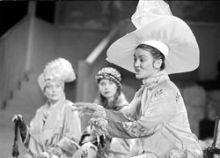Pygmalion, the legendary sculptor of Cyprus, avoided women. Once, seeking a distraction from his daily secluded routine, he chiseled an ivory statue of a young beauty and fell in love with it. Desperately, he prayed to Aphrodite for her to breathe life into the statue. The goddess answered his prayer and he married the girl who bore him a child. This is an elegiac myth, without any sanguinary undercurrents, which is very uncharacteristic of myths in general and ancient myths in particular. Small wonder that the story of Pygmalion has become one of the most favored literary subjects. The celebrated British intellectual and paradoxical playwright George Bernard Shaw wrote a play, turning the king into a professor of linguistics, a bachelor to the marrow. His Galataea became a lowbrow flower-girl. And the divine intervention was delegated to the magic power of language.
The play had a second birth, in terms of international publicity and commercial success, after World War II when Frederick Loewe staged his famous musical My Fair Lady (1954). Ten years later, the plot was used for the motion picture starring Audrey Hepburn winning audiences the world over. Ever since the play has been regarded as a purely entertaining rendition. Serhiy Danchenko has remained true to the tradition. His Pygmalion is meant primarily to liven up the company’s repertoire and boost box-office receipts. The genre could be described using the old formula: a theatrical production with songs, music, and dances integrated into a dramatic plot. He calculated correctly, and the first night saw a packed audience. It is safe to assume that it will remain full for the next couple of seasons. Indeed, the personae sing and dance on a revolving stage revealing spacious aristocratic interiors designed by Andriy Oleksandrovych-Dachevsky. In a word, audiences have enough to feast their eyes and ears on. Still, the play’s tour de force, the most exquisite vignette is formed by Anatoly Khostykoiev, Bohdan Beniuk, and Liubov Kubiuk. Khostykoiev, as Prof. Higgins, managed to transform his macho charms into a captivating ever disheveled academic-hermitic bachelor, constructing a classical image of a mad scientist. His character is funny as well as temperamental (sometimes overly so), and by no means a bookworm. Rather, a musketeer-type compelled by fate to replace the rapier with a quill, a Frankenstein turned inside out. Liubov Kubiuk, as his mother, is the exact opposite of her insufferable offspring. A refined aristocrat, she combines faultless manners with an iron will. Perhaps the only way the mother of a convinced bachelor should be: irresistibly charming, a bit sarcastic, and always understanding.
However, the most striking metamorphosis in the plot is performed by Bohdan Beniuk. His Alfred Doolittle is actually the original Galatea. His first appearance on stage is unforgettable: an epic wino, blurting out universally acknowledged truisms. His tears for his lost daughter are genuine, just as is his determination to receive five quid for the flesh of his flesh, just that much, not a shilling more; he is adamant. No, he never squeezes money out of other people. Unfortunately, he has his principles. In fact, this makes his second appearance even more striking. Clad in a tight bourgeois surtout, wearing a bowler, sporting a walking cane, and looking sulky, he is John Bull incarnate, the satirical Englishman who half the world with his conquered plain talk and wallet. Yet the actor skillfully conveys his character’s deep inner rift. Innately decent and straightforward, he could previously profess his philosophy in market squares and pubs, almost like Diogenes. Now he is denied these little joys, having to work off the money bestowed on him by those obviously unprincipled gentlemen. Bohdan Beniuk, however, remains true to his own character. He portrays every trait of Alfred Doolittle not just accurately, but with a keen sense of humor.
Shaw is not exactly popular with most drama companies these days, at least not in Kyiv. This is something hard to explain, because his works combine entertainment and intellect in abundance, and they can be staged as both chamber and gala shows. Perhaps after the notion of catastrophe, of disaster, has become a part of our lifestyle, and dramas written on the eve of disaster fail to attract public interest. Instead, the public wanted a mix of shows and musicals. Just like Shaw, Danchenko leaves the finale open, which makes the end of the performance a bit vague. Eliza Doolittle returns to Prof. Higgins. Why? To buy him a necktie? To inquire triumphantly what would he have done without her? Or perhaps the frustrated Higgins only sees her in a dream?
An audience eagerly awaiting answers to unspoken questions could perhaps be further entertained by receiving them. Yet we see ruins in the street, in our art, in our minds, in our history. These ruins are precisely such unspoken questions.
The theater does not want to answer them. Perhaps it should not.








